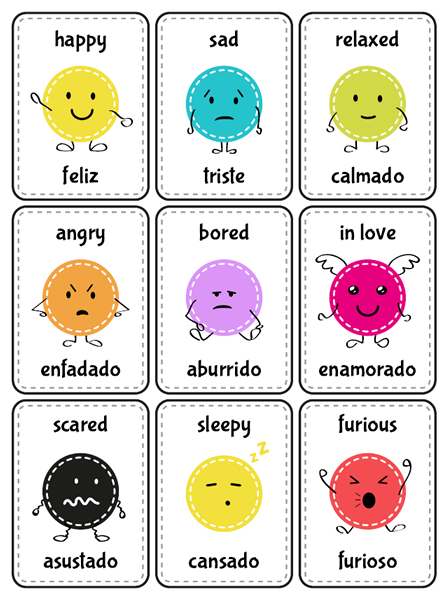In this lesson, we will learn common words related to feelings and emotions in Spanish. This vocabulary list will help you easily express how you feel about something.
Spanish vocabulary - Feelings and emotions
Negative feelings and emotions
- sad - triste
- unhappy - infelix
- angry - enojado (masculine)/enojada (feminine)
- bored - aburrido/aburrida
- anxious - ansioso/ansiosa
- depressed - deprimido/deprimida
- desperate - desesperado/desesperada
- worried - preocupado/preocupada
- embarrassed - avergonzado/avergonzada
- nervous - nervioso/nerviosa
- ashamed - avergonzado/avergonzada
- confused - confundido/confundida
- frustrated - frustrado/frustrada
- frightened - asustado/asustada
- hurt - dolido/dolida
- insecure - inseguro/insegura
- impatient - impaciente
- jealous - celoso/celosa
- shy - tímido/tímida
- terrible - fatal
- furious - furioso/furiosa
- uncomfortable - incómodo/incómoda
- tired - cansado/cansada
- lonely - solitario/solitaria
- sleepy - soñoliento/soñolienta
- disgusted - disgustado/disgustada
Positive feelings and emotions
- happy - alegre, feliz
- comfortable - cómodo/cómoda
- delighted - encantado/encantada
- excited - emocionado/emocionada
- in love - enamorado/enamorada
- pleased - contento/contenta
- satisfied - satisfecho/ satisfecha
- proud - orgulloso/orgullosa
- relaxed - relajado/relajada
- surprised - sorprendido/sorprendida
- thankful - agradecido/agradecida
- hopeful/optimistic - optimista
- fabulous/fantastic - fabuloso/fabulosa
- interested - interesado/interesada
- relieved - aliviado/aliviada
- lucky - dichoso/dichosa

Spanish vocabulary - Feelings and emotions
Note:
- Remember to change the form of these words depending on the gender of the person that you are referring to.
See also: Gender of nouns in Spanish
- There are two main verbs that you can use to talk about how you are feeling, estar and sentirse.
Estar means "to be" in English. It can be used to describe temporary states. Sentirse means "to feel"
See also: Using estar in Spanish
For example:
Estoy nervioso/nerviosa - I'm nervous
Pedro está enojado - Pedro is angry
Me siento relajado/relajada - I feel relaxed
These two verbs are kind of interchangeable. For example, you can either "estar" or "sentirse" and it will mean exactly the same thing like "I feel angry" vs "I am angry."
However, "Anna feels sick" and "Anna is sick" might be a little bit different.
When you say Anna feels sick, she might have a horrible bout of gastro but she might also have a headache as she hasn't had her coffee this morning. So when you use "to feel", it's more about how she feels rather than whether she actually has some affliction. However, when you say "Anna is sick", it sounds like a proven fact. It's more definite.
- To ask "how do you feel", say "¿Cómo te sientes?"
- To say "a little" or "a tiny bit", use "un poco" or "un poquito". Use "muy" to say "very".
For example:
Andrés está un poco preocupado - Andrés is a little worried
Felipe está muy contento - Felipe is very happy
See also: Personality adjectives in Spanish
- If you want to say you are feeling like something, just add "como".
For example:
Me siento como una reina - I feel like a queen.
